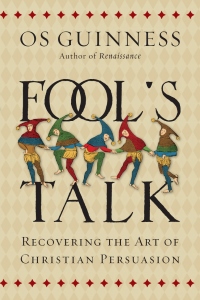Fool's Talk - a review
‘We are all apologists now, and we stand at the dawn of the grand age of human apologetics’. So claims Os Guinness at the start of his magnum opus, Fool’s Talk: Recovering the Art of Christian Persuasion. He’s referring to the age of the internet where ‘everyone is now in the business of relentless self-promotion’. Therefore, ‘everyone can communicate with everyone else from anywhere and at any time’ (15).
Guinness claims the opportunities this presents for Christian witness are the greatest since the time of the New Testament. Yet he also recognises the challenges are real and profound. Fool’s Talk urgently seeks a recovery of Christian persuasion,
a way of apologetics that is as profound as the good news we announce, as deep as the human heart, as subtle as the human mind, as powerful and flexible as the range of people and issues that we meet every day in our extraordinary world in which 'everyone is now everywhere' (16)
Guinness convincingly shows that this subversive approach is everywhere in Scripture
In the first five chapters, Guinness lays out his principles. From the outset he rejects evangelistic techniques that treat everyone the same way: ‘There is no McTheory when it comes to persuasion’ (32). Instead he insists on a personal approach, driven by love for God, which is shaped profoundly by the truths we seek to proclaim. This is the way of creative persuasion or ‘fool’s talk’, which enables those who are not open and not interested in the truth of the gospel to see it despite themselves. This happens with a ‘spring-loaded dynamic’, as ‘expectation is slowly built up in one direction, until wham, the effect of the punch line suddenly [whiplashes]…back in the opposite direction’ (154). This dynamic is exemplified in the crucifixion of Jesus Christ. It looks like his defeat by sin and death, and yet, in an ironic twist, turns out to be his defeat of sin and death. As Paul says, ‘the message of the cross is foolishness to those who are perishing, but to us who are being saved it is the power of God’ (1 Corinthians 1:18). Guinness convincingly shows that this subversive approach to communication is present everywhere in Scripture. Nathan’s clever parable in 2 Samuel 12 leads David to see the reality of his sin, just as Jesus’ parables skewer the Pharisees without mentioning them by name. This indirect, involving and imaginative approach is also shown in questions, from the Lord’s ‘Where are you?’ in Genesis 3 onwards. This element of surprise and subversion is needed to get under the skin and behind the defences of the closed, disinterested sceptic.
 Chapters 6 and 7 go on to consider some of the strategies to which these principles lead. The first is negative: to ‘turn the tables’, pushing ideas to their logical ends and probing the inconsistencies in a person’s thought and life. The second is positive: to trigger the ‘signals of transcendence’, those things, such as joy, grief, beauty and morals, that point to a transcendent reality beyond this world.
Chapters 6 and 7 go on to consider some of the strategies to which these principles lead. The first is negative: to ‘turn the tables’, pushing ideas to their logical ends and probing the inconsistencies in a person’s thought and life. The second is positive: to trigger the ‘signals of transcendence’, those things, such as joy, grief, beauty and morals, that point to a transcendent reality beyond this world.
The remainder of the book further develops various of these themes, and answers some powerful objections about the whole enterprise of Christian persuasion: Isn’t apologetics only for the educated? Aren’t Christians and the church hypocrites? What about the anti-apologetics stance within the church from some conservatives and many liberals? Guinness speaks with pastoral concern into a number of areas that could be a snare to the apologist, encouraging humility and integrity, before closing with a roadmap of the seeker’s journey to faith.
bursting with incisive cultural analysis, theological depth and excellent anecdotes
Fool’s Talk is vintage Guinness, written in his customary tight and quotable prose, bursting with incisive cultural analysis, theological depth and excellent anecdotes. I found the chapter entitled Anatomy of Unbelief to be particularly insightful, both for helping our apologetics as well as deepening our doctrine of sin. It is a profoundly wise book, written by someone who has both thought deeply about his subject and also, crucially, practiced Christian persuasion widely. Guinness reveals he has waited 40 years to write this book. Those decades of experience shine through in many insights and in his evident love for the Lord and the lost. I found this gave the second half of the book a slightly meandering quality as he moved away from his central thesis to engage with broader concerns.
Unsurprisingly, given Guinness’s description of technique as ‘the Devil’s bait’, this is no ‘how-to-in-seven-easy-steps’ book. It’s far deeper and richer than that, laying foundations, outlining an appropriate posture towards God and others, and unpacking principles. It would also be well worth hearing Guinness work out these principles in practice – I suggest listening to this series of talks.
Fool’s Talk isn’t a book of practical tips to sharpen your witness, or a basic defence of the legitimacy and theological foundation of apologetics. Rather, it is a powerful call to Christian persuasion which richly unpacks the shape, dynamics and feel of that urgent enterprise. As such, it is a uniquely fresh and stimulating contribution to the subject, and one that I plan to return to again and again.
Title: Fool’s Talk: Recovering the Art of Christian Persuasion
Author: Os Guinness
Publisher: IVP USA
Publication Date: 2015
Pages: 270
Price: £17.72



